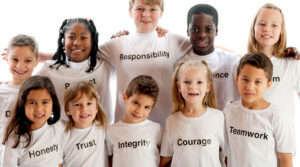Child Development: Role of Parents and Teachers IN Inculcating values
(Relevant for Ethics, Integrity and Aptitude)

Role of Parents
Mere knowledge and intelligence alone are insufficient for a child’s development without self-confidence. The concept of child development lacks clarity and is not concise or precise. The fundamental questions regarding what a child is, what development entails, and why it is important remain unanswered. A child should not be viewed merely as a means to fulfill the parents’ dreams or as a burden; instead, childhood should be cherished and enjoyed.
Development involves learning, adapting, and changing, but the pace and pattern of development vary among children. Some children develop rapidly, like a caterpillar transforming into a butterfly, while others face struggles and challenges. Development encompasses various aspects such as health, education, social interaction, intellect, morality, ethics, and spirituality. Social interaction plays a crucial role in a child’s learning as a secluded and isolated child learns very little.
Parents, teachers, siblings, elders, and friends all play vital roles in a child’s development, with the family and teachers having particularly significant influences. Ideally, a conventional family structure consisting of a married husband and wife living together is considered the best environment for child development. However, the reality is that family structures can vary widely, including single-parent households, working couples, or families where gender roles are non-traditional. Each family situation has a distinct impact on the child, and teachers need to understand and respect the diversity of family structures to effectively support the child’s development.
During the developmental stage, children often face two major challenges: eating and learning. Many parents find that their children do not eat well in terms of quality and quantity, which may be due to parental ignorance or anxiety. Providing the right food, in the right amount, and at the right time remains a persistent concern. Learning, on the other hand, involves gathering information, comprehending it, and making meaning out of it.
Language and communication skills are essential tools for learning, with informal learning occurring through social interactions and formal learning taking place in school settings. Language skills aid in conceptualization, while effective communication facilitates social interaction. Prioritizing the child’s questions and encouraging their curiosity fosters a positive learning experience. Each child is unique and possesses strengths and talents, and praising their achievements at every stage promotes a joy for learning. Teachers and parents should help children learn from both successful and unsuccessful experiences.
Children have diverse personalities and inclinations. Some may be action-oriented and enjoy sports and physical activities, while others may be sociable and thrive in social settings. Some children may have a philosophical inclination, preferring deep thinking and maintaining few close friendships. Others may be visually inclined, expressing themselves through drawing and painting. Musical talents may come naturally to some, enabling them to recognize and reproduce songs and melodies. There are also logical thinkers who enjoy numbers and problem-solving, as well as linguistic individuals who excel in reading, crosswords, and verbal expression.
Some children are thinkers, while others are dreamers. When learning aligns with their inherent talents and aptitudes, it becomes easier and more enjoyable for them. A positive and nurturing environment in the first three years of a child’s life greatly contributes to their growth and development. Self-confidence, self-esteem, and initiative are key attributes that set a child apart and enable them to shine. Mere knowledge and intelligence are not enough; without these traits, a child may feel diffident and insignificant.
In raising a morally upright child, I would like to offer a suggestive approach rather than a prescriptive one. There are multiple options depending on the socio-economic and cultural context.
To master these intricacies and fare well in the Sociology Optional Syllabus, aspiring sociologists might benefit from guidance by the Best Sociology Optional Teacher and participation in the Best Sociology Optional Coaching. These avenues provide comprehensive assistance, ensuring a solid understanding of sociology’s diverse methodologies and techniques.
Best Sociology Optional Teacher, Best Sociology Optional Coaching, Sociology Optional Syllabus, Child Development, Role of Parents, Role of Teachers, Social Interaction, Family Structures, Learning Challenges, Language Skills, Communication Skills, Personality Types, Moral Development, Self-confidence, Self-esteem, Initiative, Individual Strengths, Socio-Economic Context, Cultural Context.
Follow us :
🔎 https://www.instagram.com/triumphias
🔎https://www.youtube.com/c/TriumphIAS
https://t.me/VikashRanjanSociology
Find More Blogs
|
Scope of the subject and comparison with other social sciences |
|||
|
|
|
|
Modernity and social changes in Europe |

